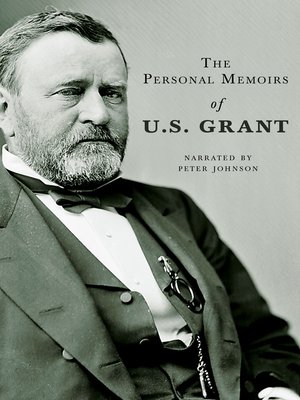
Sign up to save your library
With an OverDrive account, you can save your favorite libraries for at-a-glance information about availability. Find out more about OverDrive accounts.
Find this title in Libby, the library reading app by OverDrive.



Search for a digital library with this title
Title found at these libraries:
| Loading... |
Among the autobiographies of generals and statesmen, these memoirs rank with the greatest. Mark Twain hailed them as " the best of any general' s since Caesar." Refreshingly candid and honest, Grant' s assessment of his humble beginnings, his rise to fame, and his greatest triumphs and failures has become an American classic. Part Two: The Vicksburg Campaign General Grant wrote this book while dying of throat cancer. He had been swindled by a dishonest Wall Street Broker and his trophies and possessions were stripped from him to satisfy the demands of his debtors. Bankrupt, suffering from a terminal illness and never passing a moment without acute pain, he produced this magnificent monument to his greatness. Those who denigrate Grant as a drunkard, butcher or bumbling President need to read this book in order to correct these errant assumptions. It is impossible to read this book and not realize that Grant was an inordinately intelligent man and one hell of a writer. Grant's Memoirs are a deserved classic in American literature and considered the greatest military Memoirs ever penned, exceeding Caesar's Commentaries. Grant wrote as he lived: with clear, concise statements, unembellished with trivialities or frivolities. The only "criticism" the reader might have is that Grant bent over backwards not to wound the feelings of people in the book. He takes swipes at Joe Hooker and Jeff Davis, but what he left unsaid would have been far more interesting. A compelling and logical reason why Grant was so spare in his comments was because he was involved in a race with death. He didn't know how long he could live and therefore, "cut to the chase." Part Three: The Wilderness Campaign; Surrender at Appomattox Grant's assessments of Lincoln, Sherman, Sheridan and other military leaders are brilliant and engrossing. His style, like the man himself, was inimitable and couldn't be copied. In everyday life, Grant was a very funny man, who liked to listen to jokes and tell them himself. His sense of the absurd was acute. It's no accident that he loved Mark Twain and the two hitched together very well. Twain and Grant shared a similar sense of humor, and Grant's witicisms in the Memoirs are frequent, unexpected and welcome. There are portions where you will literally laugh out loud. Though Grant's Memoirs were written 119 years ago, they remain fresh, vibrant and an intensely good read. I have read them many times in my life and I never weary of the style and language that Grant employed. He was a military genius to be sure, but he was also a writer of supreme gifts, and these gifts shine through on every page of this testament to his greatness. All Americans should read this book and realize what we owe to Grant: he preserved the union with his decisive brilliance. In his honor, we should be eternally grateful.






